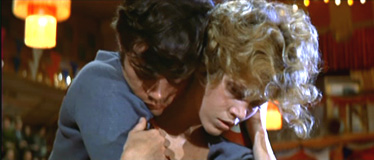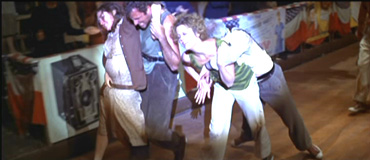|
Newest Reviews:
New Movies -
The Tunnel
V/H/S
The Tall Man
Mama Africa
Detention
Brake
Ted
Tomboy
Brownian Movement
Last Ride
[Rec]³: Genesis
Hara-Kiri: Death of a Samurai
Indie Game: The Movie
Abraham Lincoln: Vampire Hunter
Old Movies -
Touki Bouki: The Journey of the Hyena
Drums Along the Mohawk
The Chase
The Heiress
Show
People
The Strange Affair of Uncle Harry
Pitfall
Driftwood
Miracle Mile
The Great Flamarion
Dark Habits
Archives -
Recap: 2000,
2001, 2002,
2003, 2004
, 2005, 2006,
2007 , 2008
, 2009 ,
2010 , 2011 ,
2012
All reviews alphabetically
All reviews by star rating
All reviews by release year
Masterpieces
Screening Log
Links
FAQ
E-mail me
HOME
| |
They Shoot Horses, Don’t They? (Sydney Pollack, 1969)
 Even more emotionally exhausting than its traumatic opening
moments suggest, Sydney Pollack’s fine adaptation of the novel They
Shoot Horses, Don’t They? powers along to its stunning conclusion with a
fleet of superior performances and a cynical worldview that rarely lets up.
Recounting the events of a 1930s dance marathon, the film quickly manages to
close the temporal gaps between its period and modern times with critical themes
that still resonate strongly today. At first it seems mildly lazy that the film
trots out contestants so varied that they feel like “types”, but because of
this variety, the central metaphor becomes so expansive that it turns into a
damning indictment of the American dream, capitalism, and every other heartland
cliché that the writers could think up. The marathon becomes a demented
microcosm of the nation’s Depression-era hopes and dreams duke it out for
supremacy as a glib emcee cheapens everything that happens, with a robotic,
mocking, “Yowza, Yowza, Yowza!” that’s too similar each time it’s
shouted to be genuine. The numerous contestants vie for fame, money, or just a
bite to eat, each pushing their bodies to its breaking point as the contest
stretches from days to weeks to months long, allowing their troubles to be made
into spectacle (which the ringleader defends by saying that’s “strictly
business”). Their determination and deglamorization is a given in a film
that’s showcasing an endurance test like this, but even though it’s
expected, it’s still powerful on screen.
Even more emotionally exhausting than its traumatic opening
moments suggest, Sydney Pollack’s fine adaptation of the novel They
Shoot Horses, Don’t They? powers along to its stunning conclusion with a
fleet of superior performances and a cynical worldview that rarely lets up.
Recounting the events of a 1930s dance marathon, the film quickly manages to
close the temporal gaps between its period and modern times with critical themes
that still resonate strongly today. At first it seems mildly lazy that the film
trots out contestants so varied that they feel like “types”, but because of
this variety, the central metaphor becomes so expansive that it turns into a
damning indictment of the American dream, capitalism, and every other heartland
cliché that the writers could think up. The marathon becomes a demented
microcosm of the nation’s Depression-era hopes and dreams duke it out for
supremacy as a glib emcee cheapens everything that happens, with a robotic,
mocking, “Yowza, Yowza, Yowza!” that’s too similar each time it’s
shouted to be genuine. The numerous contestants vie for fame, money, or just a
bite to eat, each pushing their bodies to its breaking point as the contest
stretches from days to weeks to months long, allowing their troubles to be made
into spectacle (which the ringleader defends by saying that’s “strictly
business”). Their determination and deglamorization is a given in a film
that’s showcasing an endurance test like this, but even though it’s
expected, it’s still powerful on screen.
 The steadfast intensity of haggard the actors creates the
energy that powers the audience through this profoundly disillusioned look at an
almost literal rat race. Except for a few establishing shots near the start and
some awkwardly placed flashes forward, the entire film takes place within the
dance hall, giving the film a claustrophobic feel. The grueling and monotonous
tone that the dancers feel extends into the film itself, and when the shrill
siren that tells them to go back on the dance floor after each brief ten minute
break rings, it jolts the viewers as much as the actors because it means only
more of the same is coming. The fictional paying audience shells out to watch their misery
in hopes of forgetting their own during the Depression, but modern movie
audiences will invariably feel sympathy toward the poor souls. Despite that
level of identification, moments of catharsis are rare here. Endlessly negative,
the movie goes out of its way to deny the audience any moments of joy, opting
instead to retreat further and further into the phantasmagoric fever dreams of the
exhausted group. The tone only ever stumbles during the flashes forward. These
cutaways are supposed to feel foreboding, but they have the opposite effect,
relieving some of the intentional tedium that the film otherwise strives to
build. Thankfully, when it moves back to the dancehall after these brief
digressions, and focuses on the concentrated frenzy of the performances by
Susannah York, Jane Fonda, Bonnie Bedelia, and Gig Young, They Shoot Horses,
Don’t They? tangos with success.
The steadfast intensity of haggard the actors creates the
energy that powers the audience through this profoundly disillusioned look at an
almost literal rat race. Except for a few establishing shots near the start and
some awkwardly placed flashes forward, the entire film takes place within the
dance hall, giving the film a claustrophobic feel. The grueling and monotonous
tone that the dancers feel extends into the film itself, and when the shrill
siren that tells them to go back on the dance floor after each brief ten minute
break rings, it jolts the viewers as much as the actors because it means only
more of the same is coming. The fictional paying audience shells out to watch their misery
in hopes of forgetting their own during the Depression, but modern movie
audiences will invariably feel sympathy toward the poor souls. Despite that
level of identification, moments of catharsis are rare here. Endlessly negative,
the movie goes out of its way to deny the audience any moments of joy, opting
instead to retreat further and further into the phantasmagoric fever dreams of the
exhausted group. The tone only ever stumbles during the flashes forward. These
cutaways are supposed to feel foreboding, but they have the opposite effect,
relieving some of the intentional tedium that the film otherwise strives to
build. Thankfully, when it moves back to the dancehall after these brief
digressions, and focuses on the concentrated frenzy of the performances by
Susannah York, Jane Fonda, Bonnie Bedelia, and Gig Young, They Shoot Horses,
Don’t They? tangos with success.
* * * *
01-30-03
Jeremy Heilman
|